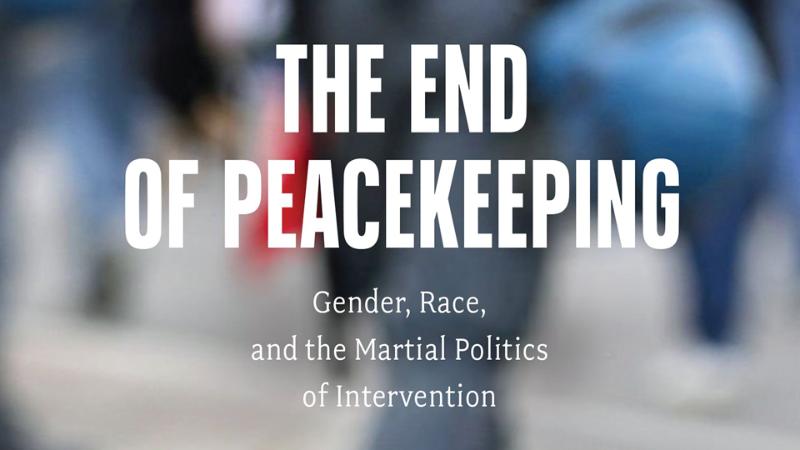- Date(s)
- May 7, 2024
- Location
- Senate Room, Lanyon Building, QUB
- Time
- 13:00 - 14:30
- Price
- Free
Speaker and Event Chair:
Professor Debbie Lisle, Institute Fellow: The Politics and Security of Institutional Peacebuilding and Professor of International Relations, School of History, Anthropology, Philosophy and Politics (QUB)
Panellists:
Professor Marsha Henry, Secretary Hillary Rodham Clinton Chair in Women, Peace, Security and Justice, Mitchell Institute (QUB)
Dr Maria-Adriana Deiana, Institute Fellow: Religion, Arts and Peacebuilding and Senior Lecturer in Politics and International Relations, School of History, Anthropology, Philosophy and Politics (QUB)
Dr Hannah Partis-Jennings, Lecturer, School of History, Anthropology, Philosophy and Politics (QUB)
In this Roundtable, Prof Marsha Henry and will present the key themes of her forthcoming book The End of Peacekeeping: Gender, Race and the Martial Politics of Intervention (University of Pennsylvania Press, April 2024), based on over 2 decades of her research on gender, peace and security; gender and militarisation; gender and development; and intersectional feminist methodologies.
The End of Peacekeeping makes use of feminist, postcolonial, and anti-militarist frameworks to expose peacekeeping as an epistemic power project in need of abolition. Drawing on critical concepts from Black feminist thought, and from postcolonial and critical race theories, Marsha shows how contemporary peacekeeping produces gender and racial inequalities through increasingly militarized strategies. She uses an intersectional analysis of peacekeeping based on more than fifteen years of ethnographic fieldwork in peacekeeping missions and training centres around the world, including interviews with UN peacekeepers, humanitarian aid personnel, and local populations. Marsha demonstrates how focus on the policy and practice of peacekeeping has obscured the geopolitical knowledge project at peacekeeping’s root, allowing its harms to persist unquestioned by mainstream scholarship. Arguing that we must recover critical theoretical contributions that have been side-lined within the field, she brings the insights of feminist and postcolonial scholarship to bear on peacekeeping studies, whose production of empirical data and evidence continues to provide the justification and foundation for policy and global governance actions. Revealing that peacekeeping is not the benign, apolitical project it is often purported to be, the book encourages readers to imagine and enact alternative futures to peacekeeping.
Panellists will discuss these themes from the context of their own research and areas of expertise.
Biographies
Professor Marsha Henry
Marsha’s research is concerned with the gendered and racialised politics of violence; militarisation; global south development; international aid and intervention; and conflict, peace and security.
In addition, she has published on the challenges of decolonial, intersectional, and feminist qualitative approaches, methodologies and fieldwork. She is the author of several books, the latest of which is: The End of Peacekeeping: Gender, Race and the Martial Politics of Intervention (Penn Press).
She is currently Associate Editor for Security Dialogue and has helped to develop a range of courses on gender, peace and security at the GEST Programme, University of Iceland, Iceland; UNITAR, Switzerland; and the Kofi Annan International Peacekeeper Training Centre, Ghana.
Marsha has also advised a number of national governments on women’s participation in the armed forces, combatting sexual exploitation and abuse in humanitarian settings, and developing anti-racist and diversity strategies in foreign policy ministries.
Professor Debbie Lisle
Debbie’s research engages with a number of contemporary debates in International Relations, International Political Sociology and beyond, most notably around issues of difference, mobility, security, travel, visuality, governmentality, biopolitics, materiality, technology, practice and power. Her earlier work explores the relevance of cultural and visual artifacts (e.g. contemporary travel writing, museum exhibits, photographs, art, war films) to world politics, and argues that the cultural realm tells as much about International Relations as the official documents usually privileged in this context.
Dr Maria-Adriana Deiana
Maria-Adriana’s research interests sit at the intersection of feminist international relations, critical peace and conflict studies, and border studies. In a broad sense, she mobilises feminist and other critical perspectives in International Studies to examine the interrelated issues of war, peace, and security.
Dr Hannah Partis-Jennings
Hannah works within Critical Military Studies and Feminist Peace and Conflict Studies. Her particular interests lie in military atrocity, the everyday dynamics of militarism and modes of peacebuilding in conflict-affected contexts, as well as the gender dynamics of militarism, conflict and conflict-affected environments. Hannah’s current work focuses on future war and she is the PI on a BA/Leverhulme funded project 'Gender and the Future Solider'.

